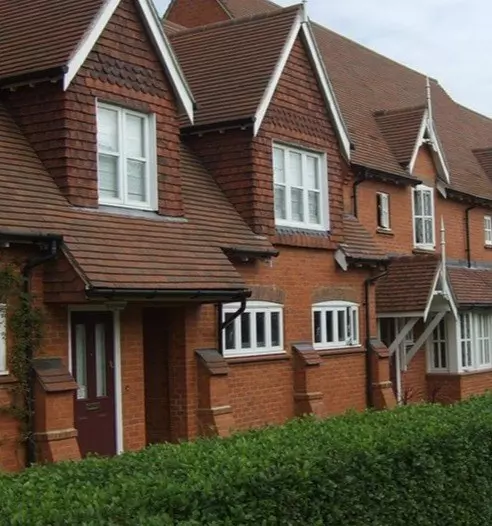If you are looking to find out what is a property asset then this page can help you. We discuss the types of property asset and how to evaluate property assets. Kent Property Witness offer RICS expert witness surveyor services for Tonbridge and Kent. Our property expert witness is an RICS expert witness surveyor offering advice on property matters for Tonbridge And Kent.
What Is Property?
The term property describes any object, site, land or building that a person or business has some legal title over. With these titles, owners may enforce certain rights and legislation over said items and sites.
You often cannot use nor live in owned spaces for free, and courses of action are taken on those who try. There is often some rental payment every month or fully paid expenses for using or renting out this property.
There is various property, tangible or intangible, including industrial equipment, automotive vehicles, real estate and furniture. Real estate is often referred to as "real property" as genuine, substantial land or buildings.
Many properties can put plenty of money in your pocket as they hold great value and can be considered significant assets and good investments for the future.
However, properties can also be liabilities can create several challenging insurance situations.
For example, if a customer sustains an injury on your company property, you, as the business owner, will be legally responsible for the customer's medical bills and any housing or property damage.
It could be harmful to the company's image and potential investors, should the situation be challenging.

Takeaways
Property is any significant item, land, design or art piece that a person or a business has some legal title over. They can enforce specific claims and copyrights over these items. Property can be tangible objects or investments like houses, farmland houses, cars, antiques, or appliances.
Or it can also be intangible items that promise future wealth for somebody, for example, bond certificates, cheques or stocks. Intellectual properties refer to ideas such as song lyrics, a company or business logo, or patents, much like a copyright licence.
Property owners can also have liabilities. Liabilities are much like debt. In business property liability, it could be that an employee or customer has an injury in the workplace. The penalty is the insurance and medical expenses that the company will have to pay for.
Understanding Types of Property
The idea of the intangible property describes assets representing potential or current value. However, the matter at hand does not carry intrinsic value themselves, i.e., stock and bond certificates.
The items or objects are simply pieces of paper and not perceivable in a physical form; they likely represent something that puts money in your pocket until stocks and bonds reach maturity or their total capacity. Other forms of intangible property, like brand reputation, are much more unclear and cannot be defined by specific documents.
Intellectual properties are also intangible properties, for example, design or website concepts, song lyrics, screenplays or book manuscripts. Whilst many of these properties do not have a physical nature, they can still harness a significant, personal value, and you may hold numerous rights over these properties.
Some examples of these include Nike's "swoosh" logo, the formula of certain foods and drink like the chemical formula for Coca-Cola, and famous singers' discographies that they have all the rights to as artists. When you own the rights to your work, when people purchase those works, you receive the money you deserve and have worked for.
To enforce some personal ownership over these intangible properties, individuals, artists, designers, and many businesses often hire lawyers and attorneys to protect their property from any copyright or infringement legally.
Stolen goods can directly impact your personal finance and overall net worth. If people are buying into a company item that has stolen a copyrighted logo, design or lyrics, you as the original owner will not reap any of the monetary benefits of your work.

Evaluating Property Assets
Auditors, appraisers and analysts factor in all of the underlying property of the business when they are calculating the overall value, along with several other assets and aspects.
An example of this is when a manufacturer of small machine parts garner £56,538 per year; however, if it owns the entire factory it operates, appraised at £706,450. The overall value becomes significantly higher.
Much higher than the initial profit may suggest. If the same company holds a patent for a part, has it can generate income substantially through licensing rights when manufacturing an item to more significant businesses. Doing so can be more common and recommended than producing the thing in-house.
That way, licensing deals often create more profitable revenue streams that frequently and vastly boost the company's overall value.
Is Your Home an Asset or Liability?
It can be quite challenging to weigh up whether your home is an asset or a liability. Often the terms can intertwine depending on the individual's situation. If you look at your house or property from a financial perspective, it is not a liability.
Liabilities are defined as something you owe to another person, like debts or properties taxes. When you buy a house, you do not owe the house to the person you bought it from, nor do you owe that property to the bank. You may, however, owe the overall balance of your mortgage interest payments.

A house, much like any other object or property that is in your possession, is the definition of an asset. An asset is something that you own.
Primary residences or assets like the house you live in harness much value for yourself as a homeowner, landlords and any other form of property owners.
Whether you assign the overall value as the price you purchased the house or the price you desire to sell the house for, that is the amount your home is worth.
Owning houses and large property short-term or long-term can often make you quite rich as they harness a lot of wealth. Many people who are property owners purchase luxury homes for themselves with all the money they have accumulated.
You may wish to offset the asset's value, and one may do this by exchanging it with the value of the mortgage, your liability. Your house is an asset, and your home subtracted by the leftover mortgage, your liability, can result in wealth, all due to your house. Whilst it may have a pretty vague and unclear definition, this is often referred to as your "equity".
All in all, there is one other definition of liability that is recognised. In a much broader sense, a liability puts the homeowner or individual at a disadvantage. Robert Kiyosaki said that debt is seen as a liability, as it reduces positive cash flow and takes money away from you. It would be best if you strived to increase positive cash flow and decrease negative cash flow.
Your assets increase your cash flow positively; they are things you have accumulated with your wealth that enhance or improve your overall net worth. While your house is an asset, it may also become a liability if it frequently results in debt.
The best way to understand this is by taking a look at the company balance sheet. The balance states the assets, liabilities and shareholders' equity of those in the company. It is one of the three income statements depicting the cash flows, and these can be used to evaluate the progress of a business.
Establishing Net Worth Through Property
Working out an individual's net worth is something that may be deciphered through calculating the overall value of the properties owned. They may own real estate, land, cars, stocks, bonds, jewellery, and potential retirement savings. If you subtract any debts or liabilities, such as maintenance costs or Taxes, you will find the homeowner's net worth from all of these assets from that final figure.
An example of this is that an individual's property and assets include a £100,000 home, a £7,000 car, and a £65,000 IRA (Individual Retirement Account).
Overall, the sum of their property will come to £172,000; however, let's say the individual has the burden of a £20,000 student loan.
On top of that, they may have a debt of a £3,000 credit card bill, this overall impacts the net worth. Those liabilities add up to around £23,000.
To find the net worth, we subtract those liabilities from the £172,000 to get a total of £149,000.
You may find that when calculating an individual's net worth, less valuable items on their property, such as furniture, clothing, etc., we make a point of not including them in the equation.

Including such things would be incredibly time-consuming; however, if the items owned have substantial value, they may be factored in. The items in questions may be antiques or scarce collectables that make significant assets or investments because of how sought after they are, with many paying hundreds or thousands to own them.
Do you want to discover the value of your property? Do you have a property asset which requires a survey for its commercial valuation? Contact our RICS property expert witness for services throughout Tonbridge And Kent.

